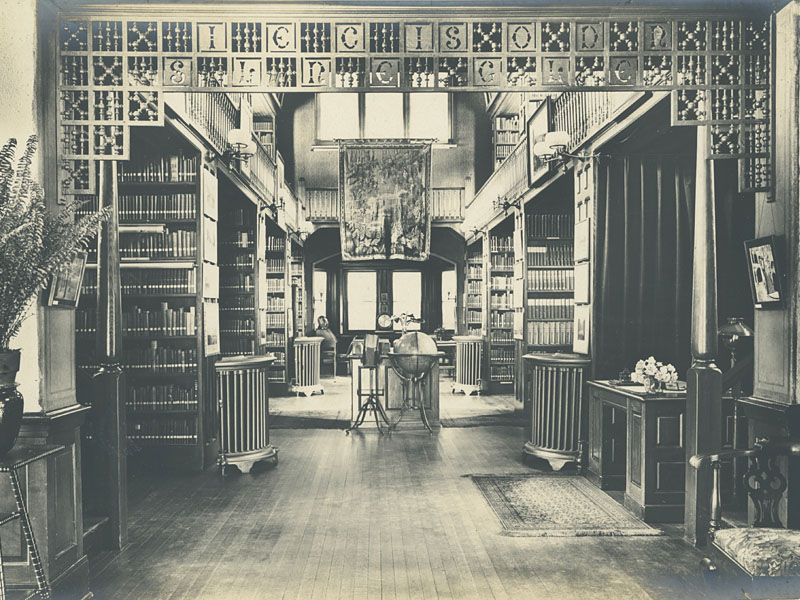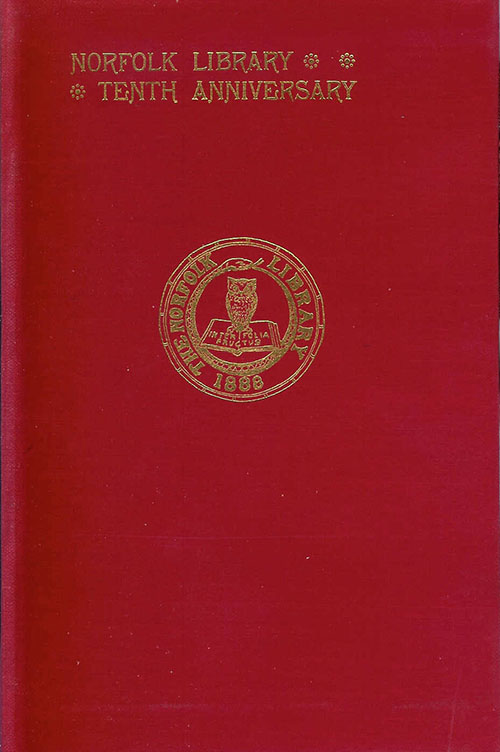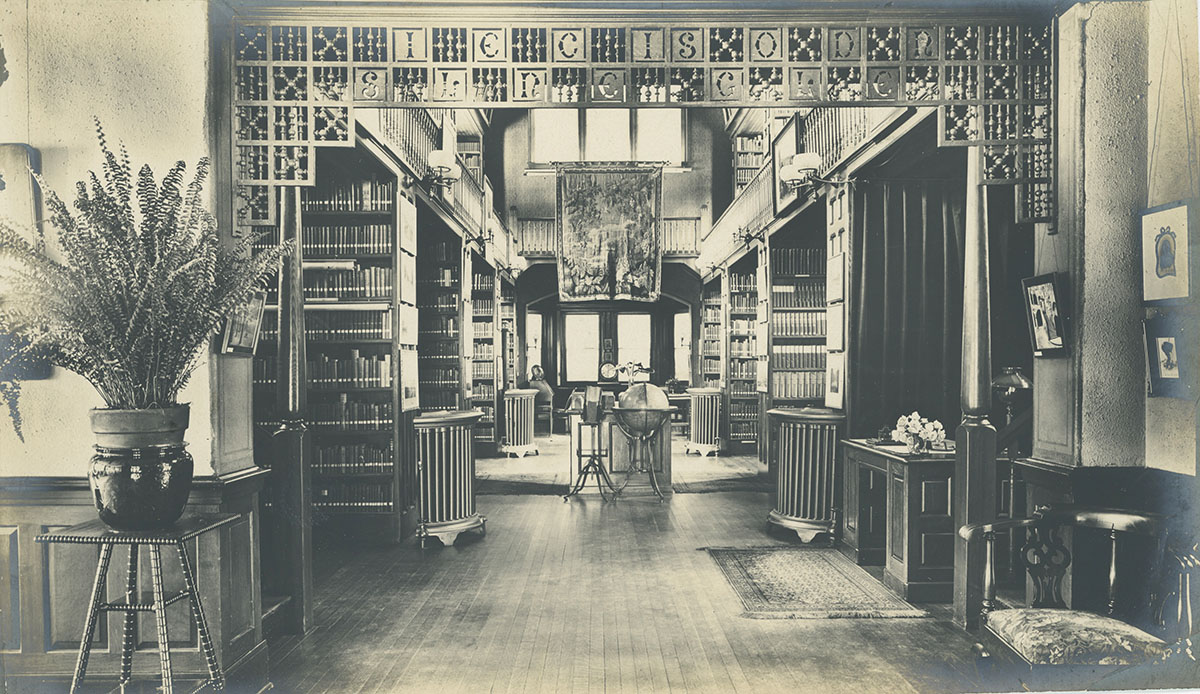
12 Aug Norfolk Library Tenth Anniversary
Norfolk Library Tenth Anniversary
by Ann Havemeyer
 “May the library be more and more a true home for rest, refreshment, and quickening,” wrote Sarah Porter to Norfolk Library founder Isabella Eldridge in 1899. The sister of Noah Porter, President of Yale College, Sarah studied privately with Yale College professors before establishing Miss Porter’s School in Farmington, Connecticut, in 1843. Isabella and her sisters attended Miss Porter’s School and benefitted from an unusually progressive curriculum that included the sciences as well as the humanities.
“May the library be more and more a true home for rest, refreshment, and quickening,” wrote Sarah Porter to Norfolk Library founder Isabella Eldridge in 1899. The sister of Noah Porter, President of Yale College, Sarah studied privately with Yale College professors before establishing Miss Porter’s School in Farmington, Connecticut, in 1843. Isabella and her sisters attended Miss Porter’s School and benefitted from an unusually progressive curriculum that included the sciences as well as the humanities.
By 1899 Miss Porter was quite frail and wrote to regret that she could not attend the celebration of the Library’s tenth anniversary on March 6 to which Isabella had invited her. Over one hundred people received formal invitations to the event. An afternoon program of music and addresses at the Library was to be followed by a luncheon at the Eldridge residence and an afternoon performance of the popular song cycle “In a Persian Garden” at the Eldridge Gymnasium (now Norfolk’s Town Hall on Maple Avenue). Many of those who responded to the invitation, such as Miss Porter, wrote letters to Isabella, and those letters are part of the Library’s Special Collections. They reflect both Isabella’s wide range of acquaintances and the importance of the Library to the community at large.
Isabella Beecher Hooker, a Norfolk summer resident and leader of the woman suffrage movement, wrote:
Dear Miss Belle,
(That’s the way I am addressed by intimate friends) – I am surely going to Norfolk on Monday to return in the afternoon because I have a big suffrage convention on hand for Wednesday of next week – Susan B. Anthony comes to me on Tuesday for the whole week – I wish you could meet her. But my present thought is that possibly the weather may not be sunshiny and in that case I should not dare risk taking cold – so I would like to send my daughter, Mrs. Dr. Hooker [Mrs. Edward Hooker], and perhaps Isabel in my place if you cordially approve. I can’t find notice of the trains in the Courant this morning but conclude there is an eight o’clock train and that I go directly to the Library on arriving. Mr. Hooker sends greetings but having a slight cold must not go so far from home.
I am faithfully yours,
Isabella Beecher Hooker
To commemorate the anniversary, Isabella privately printed a small book in a limited edition of 200 copies. Attractively bound in red cloth on board with tie ribbons and the Norfolk Library insignia in gilt lettering on the cover, the book contains the program of the day’s festivities; a facsimile of the invitation to the opening of the Library on March 6, 1889; a list of the Library’s builders and workers; photographs of the interior of the Library; and the poem Sanctuary written by Dr. Richard Burton for the occasion. She gave a copy to each invited guest and sent a copy to those who could not attend.
Frederick Wells Williams, a professor at Yale, responded:
We are delighted and gratified beyond expression by receiving the beautiful little memorial book on the Library’s tenth anniversary. I wanted extremely to accept your kind invitation to attend the ceremonies–and so, I suppose, did everyone who got one–but my grief at not being able to leave my work for such a fine spree is assuaged by having such a charming reminder of the Library and its owner.
The professor suggested that the color of the memorial book—red—symbolized the fact that “in your useful collection, all the volumes are read.” Williams had been born in China, in the Portuguese colony of Macau, in 1857 to American missionary, diplomat, and scholar Samuel Wells Williams, author of The Middle Kingdom: A Survey of the Geography, Government, Education, Social Life, Arts, Religion, &., of the Chinese Empire and Its Inhabitants (1883). The letterhead on his stationery is in Chinese characters.
In his letter to Isabella Eldridge, Howard Carter, headmaster of the Robbins School in Norfolk, reflected on the generosity of the Eldridge family: “We esteem it a rare privilege to have lived for ten years in the same community with people who could create and sustain such an institution as the Norfolk Library. You have indeed built a monument which will render your memory forever independent of granite or marble.” Carter’s son Howard Cordis Carter was born on March 6, 1889, the very day the Library opened, and on the tenth anniversary Isabella gave the ten-year old boy a silver watch to mark the occasion.
Isabella invited Hartford architect George Keller, who designed the Library, to speak at the event and sent him train tickets from Hartford to Norfolk, perhaps sensing he needed encouragement. In a letter to Isabella, he accepted with pleasure her invitation to attend and thanked her for the tickets. However, he expressed some trepidation about speaking: “I hope you will not insist on having me ‘speak a piece’ for even the thought of it terrifies me. I would much rather design a new library.” A decade later, Keller would indeed produce a new design for Isabella, expanding the original Library to the north with the addition of the Great Hall.
At the tenth anniversary celebration, guests would have entered the Library under wooden fretwork which spelled out the words Silence is Golden. The fretwork was lost long ago, and the Library today is a busy, and sometimes noisy, place. But there will always be spaces where one can find quiet, and “rest”; programs that “refresh” us, and books that enlighten, animate and “quicken” our minds.

Norfolk Library stacks, with Silence is Golden fretwork




Sorry, the comment form is closed at this time.